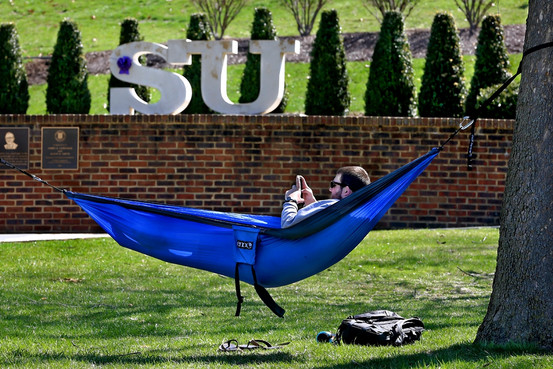
A student at Virginia's Shenandoah University relaxing this spring. Winchester Star/Associated Press
Americans slept more and worked less last year, reflecting an economy that remains groggy after the recession and an older population with more time to rest.
Averaging together both weekdays and weekends, Americans older than 14 slept for eight hours, 44 minutes and conducted work-related activities for three hours, 28 minutes each day, according to the Labor Department's annual American Time Use Survey, released Wednesday. That is 14 minutes less work a day and 10 minutes more sleep than when the survey began a decade earlier, and a bit less work and more sleep than in 2012.
When including only employed Americans, the average time on the job during days worked last year goes up to seven hours, 33 minutes, just a minute less than in 2003.
Americans have tended to sleep a bit more and work a bit less each year in the past decade. But the deep recession from 2007 until 2009 appeared to have accelerated the trends.
According to the survey, Americans' No. 1 hobby remains watching television. In 2013, respondents said they spent an average of two hours, 46 minutes a day watching TV, 11 minutes more than in 2003 but down slightly from the previous year.

"The data defies popular expectations," said John P. Robinson, a sociology professor at the University of Maryland. "People say they're too busy for leisure and don't have time to sleep, but that seems not to be the case."
The numbers are collected from about 11,400 individuals via phone interviews where participants are asked to reconstruct a diary of the previous day. Participants are selected to ensure estimates are nationally representative, the Labor Department said.
It is difficult to grasp precisely why people have shifted how they spend their days. But demographics and economics play a large role.
The U.S. population is aging, with 8,000 people turning 65 each day, according to AARP, the seniors' lobbying group. Many of those individuals are retired or working part time and thus have more time to sleep, watch television, play shuffleboard and other nonwork activities.
The graying population and a still-weak labor market explain why the share of Americans with jobs fell to 58.6% in the 2013 survey from 62.3% a decade earlier. The unemployment rate was 6.7% at the end of last year, above the 5.7% at the end of 2003.
Older workers, especially males in their 50s, have struggled to regain jobs lost during the recession, said Donald Grimes, a University of Michigan labor economist. Meanwhile, younger people with shaky job prospects are spending more time in college and less working, perhaps reflected by Americans' spending an extra minute a day on education, according to the survey.
"Essentially, the share of the population who works zero hours per day is growing faster than the employed," Dr. Grimes said.
The migration of the Internet from the domain of desktop computers to hand-held devices also shows up in the numbers. TV watching, while up from 2003, is down from its peak of almost two hours, 50 minutes a day in 2009, suggesting Americans are turning their sights to other screens.
Most other types of leisure, including reading, socializing in person and taking a second to think, have edged down since 2003. One exception:playing videogames and other "computer use for leisure," which includes posting pictures on Facebook and mindlessly surfing the Web to kill time. On weekend days, men spend 38 minutes on this activity, 13 minutes more than in 2009.(The 2003 data for the category aren't directly comparable.)
Americans spent four minutes less a day shopping than a decade ago, as the Web speeds price comparison and lets consumers skip visits to stores.
"Shopping is so much easier than it was a decade ago," said Tara Sinclair, an economist at George Washington University. "I can remember when I'd browse a record store. Now, Amazon tells me what I like."
Write to Eric Morath at eric.morath@wsj.com


















